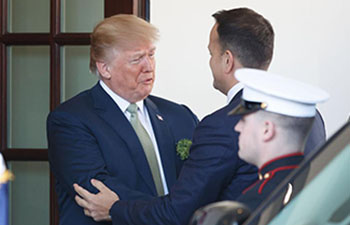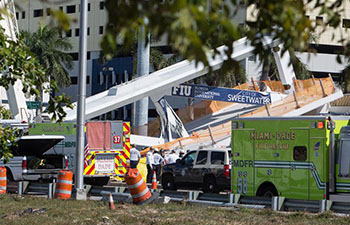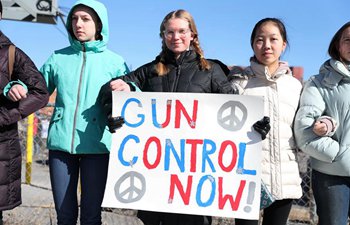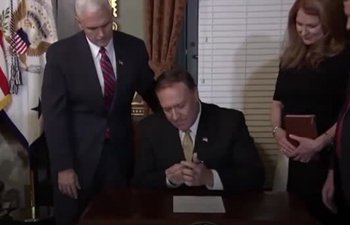by Matthew Rusling
WASHINGTON, March 14 (Xinhua) -- Known for hawkish foreign policy views, the incoming U.S. secretary of state seems far more eager to rock the boat than his predecessor. That may indicate a more tumultuous road ahead, and may push Washington to further turn up the heat on countries like the Democratic People's Republic of Korea (DPRK), U.S. experts said.
POMPEO TOUGHER THAN PREDECESSOR
Mike Pompeo, the new nominee for U.S. Secretary of State, is likely to be tougher than his predecessor on key U.S. foreign policy issues. That could egg on President Donald Trump's administration to behave in a more hawkish manner, especially regarding Iran and tensions on the Korean Peninsula, the experts said.
"The White House will likely take a tougher stance on foreign policy because there will be fewer impediments to Trump being Trump," Brookings Institution Senior Fellow Darrell West told Xinhua.
Pompeo's nomination comes at a time of heightened tensions on the Korean Peninsula, despite the goodwill expressed at the recent Winter Games in South Korea. While his predecessor, outgoing Secretary of State Rex Tillerson, was seen as a voice of reason, the Trump administration wants to fill the position of head diplomat with someone who is more like Trump -- eager to shake things up.
Pompeo has made numerous hawkish statements about DPRK. Last October, he said Pyongyang would soon be able to threaten a U.S. city with nukes, and blasted previous U.S. presidents for failure to stop the perceived threat.
With Pompeo in a key position, "the president will have greater leeway to follow his own instincts on foreign policy and he will be less restrained in taking actions," West said.
Experts also said that having Pompeo at his side, instead of the less confrontational Tillerson, could result in a more impulsive U.S. president.
"Trump probably will be more impulsive and more prone to rattle cages around the world," West said of the change Pompeo could bring to the administration.
POMPEO'S PRIORITY: THE DPRK
If he is confirmed by the Congress, Pompeo's first job will be to deal with the summit meeting with the DPRK, which is slated for May, although it remains unknown exactly what his plans are for that summit. Experts reckon he will continue to exert pressure on the DPRK, and even ratchet up the heat on DPRK leader Kim Jong-un.
Troy Stangarone, senior director with the Washington-based Korea Economic Institute, said that with Tillerson gone, it removes one of the voices of moderation and a supporter of engagement.
"While Tillerson was often undercut by Trump, his efforts at diplomacy are most likely under appreciated in getting us to the point where we are now. With Pompeo set to replace him, I would expect that to strengthen the voices of skepticism towards North Korea and for him to be more supportive of taking a harder line in general and at the summit with Kim Jong-un," he told Xinhua, speaking of the upcoming May summit on the issue.
"That being said, Pompeo could improve the chances for diplomacy. He is respected by the president and will be seen as representing his views," Stangarone said.
Pompeo has also had harsh words for Iran, and has compared the nation to the Islamic State, the radical terrorist group that at one point overran vast swaths of the Middle East. He has also called Iran a "thuggish police state," and has blasted the Iran nuclear deal, saying he looked forward to rolling back this disastrous deal with the world's largest state sponsor of terrorism."
AMERICA FIRST FOREIGN POLICY
Some experts argued that the change will make it less complicated to push for an "America first" foreign policy.
Dan Mahaffee, senior vice president and director of policy at the Center for the Study of Congress and the Presidency, told Xinhua that Tillerson's ouster "makes it much easier to have an America First approach in the truest sense of what was heard on the campaign trail, as President Trump is removing a moderate, pragmatic voice from his cabinet."
"It certainly makes the Iran situation more complicated, as Secretary Tillerson was advocating for adjustments to the deal in concert with allies rather than tearing up the deal," he said, referring to the controversial Iran nuclear deal.
"Vis-a-vis DPRK, it further sidelines the State Department and traditional diplomatic efforts as the effort is largely being driven by Trump himself," he said of Tillerson's removal.













